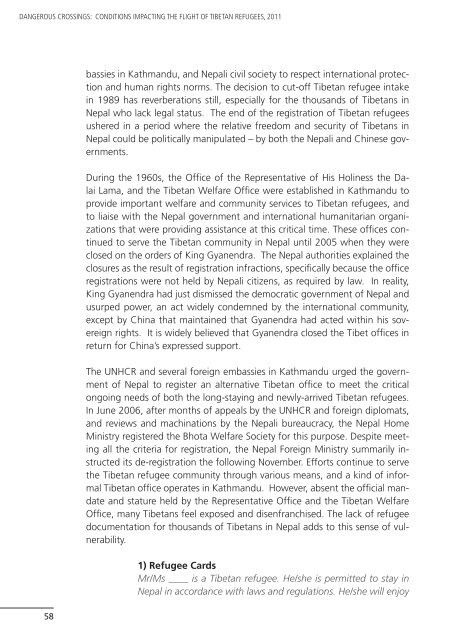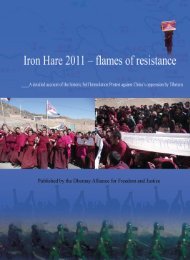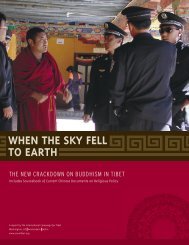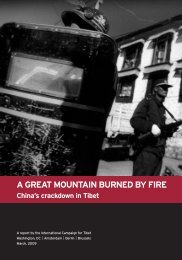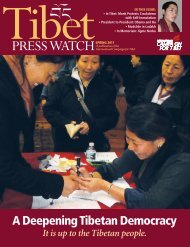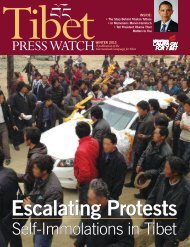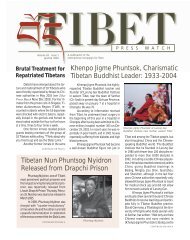DANGEROUS CROSSING: - International Campaign for Tibet
DANGEROUS CROSSING: - International Campaign for Tibet
DANGEROUS CROSSING: - International Campaign for Tibet
Create successful ePaper yourself
Turn your PDF publications into a flip-book with our unique Google optimized e-Paper software.
<strong>DANGEROUS</strong> <strong>CROSSING</strong>S: CONDITIONS IMPACTING THE FLIGHT OF TIBETAN REFUGEES, 2011<br />
58<br />
bassies in Kathmandu, and Nepali civil society to respect international protection<br />
and human rights norms. The decision to cut-off <strong>Tibet</strong>an refugee intake<br />
in 1989 has reverberations still, especially <strong>for</strong> the thousands of <strong>Tibet</strong>ans in<br />
Nepal who lack legal status. The end of the registration of <strong>Tibet</strong>an refugees<br />
ushered in a period where the relative freedom and security of <strong>Tibet</strong>ans in<br />
Nepal could be politically manipulated – by both the Nepali and Chinese governments.<br />
During the 1960s, the Office of the Representative of His Holiness the Dalai<br />
Lama, and the <strong>Tibet</strong>an Welfare Office were established in Kathmandu to<br />
provide important welfare and community services to <strong>Tibet</strong>an refugees, and<br />
to liaise with the Nepal government and international humanitarian organizations<br />
that were providing assistance at this critical time. These offices continued<br />
to serve the <strong>Tibet</strong>an community in Nepal until 2005 when they were<br />
closed on the orders of King Gyanendra. The Nepal authorities explained the<br />
closures as the result of registration infractions, specifically because the office<br />
registrations were not held by Nepali citizens, as required by law. In reality,<br />
King Gyanendra had just dismissed the democratic government of Nepal and<br />
usurped power, an act widely condemned by the international community,<br />
except by China that maintained that Gyanendra had acted within his sovereign<br />
rights. It is widely believed that Gyanendra closed the <strong>Tibet</strong> offices in<br />
return <strong>for</strong> China’s expressed support.<br />
The UNHCR and several <strong>for</strong>eign embassies in Kathmandu urged the government<br />
of Nepal to register an alternative <strong>Tibet</strong>an office to meet the critical<br />
ongoing needs of both the long-staying and newly-arrived <strong>Tibet</strong>an refugees.<br />
In June 2006, after months of appeals by the UNHCR and <strong>for</strong>eign diplomats,<br />
and reviews and machinations by the Nepali bureaucracy, the Nepal Home<br />
Ministry registered the Bhota Welfare Society <strong>for</strong> this purpose. Despite meeting<br />
all the criteria <strong>for</strong> registration, the Nepal Foreign Ministry summarily instructed<br />
its de-registration the following November. Ef<strong>for</strong>ts continue to serve<br />
the <strong>Tibet</strong>an refugee community through various means, and a kind of in<strong>for</strong>mal<br />
<strong>Tibet</strong>an office operates in Kathmandu. However, absent the official mandate<br />
and stature held by the Representative Office and the <strong>Tibet</strong>an Welfare<br />
Office, many <strong>Tibet</strong>ans feel exposed and disenfranchised. The lack of refugee<br />
documentation <strong>for</strong> thousands of <strong>Tibet</strong>ans in Nepal adds to this sense of vulnerability.<br />
1) Refugee Cards<br />
Mr/Ms ____ is a <strong>Tibet</strong>an refugee. He/she is permitted to stay in<br />
Nepal in accordance with laws and regulations. He/she will enjoy


